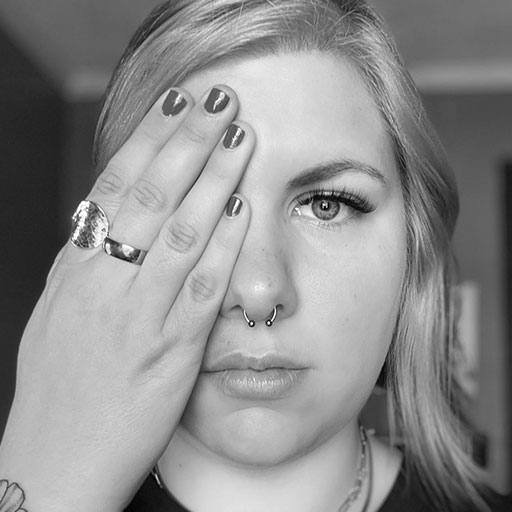Episode 2
Going in Blind
August 15, 2022
In this episode, Lyndsay Soprano talks with guest, Ashley Gerber about her journey with Multiple Sclerosis (MS), beginning at age 23. MS is a disease in which the immune system eats away at the protective covering of nerves, also known as the Myelin sheaths, causing damage to the nerves. This nerve damage disrupts communication between the brain and the body, causing symptoms such as vision loss, pain, fatigue, and impaired coordination. MS has been coined the “Snowflake Disease,” because each patient’s symptoms, severity, and duration is different. Selma Blair has been a notable voice in the MS community, sharing her story in a recent documentary, “Introducing, Selma Blair.”
Ashley’s journey began when she woke up one morning and couldn’t see out of her right eye. She went to the emergency room and was told that she was just experiencing an Ocular migraine, and was sent home. After a visit with her family doctor, where it was blamed on stress, and several days later with no improvement, she went back to the emergency room and was finally referred to an eye specialist.
The eye specialist got her in to see a neurologist the same day, who then referred her for an MRI that showed multiple lesions, notably on the ocular nerve, which was causing the blindness. This is called Optic neuritis. With the addition of a spinal tap, she was provided a diagnosis of MS. Ashley notes that there were many times throughout her life when she would confide in her doctor about symptoms she was having, that ended up being MS symptoms, and was ultimately dismissed. She recalls many years of pain that was chalked up to her weight or menstruation and never investigated further.
In the years since being diagnosed, she had endured multiple flares, which are periods of time when new symptoms appear or old ones worsen. These can sometimes be brought on by stress or overexertion. The treatment for a flare mainly consists of IV steroids to help reduce the inflammation within the body, but is basically meant to shorten the duration, not immediately end. There are many disease modifying drugs available today, but she has chosen to forgo those treatments at this time due to past complications. Due to living in rural Pennsylvania, she doesn’t have access to many cutting-edge treatments without extensive travel.
After diagnosis, she struggled to find her new normal. She had lost her job in healthcare because she had to take time off to recover, many friends distanced themselves, and she fell into a deep depression. She had suicidal thoughts and overall felt sorry for herself. She slowly began to put the pieces back together a few months later when she started doing remote work and ultimately met Lyndsay. The pair have known each other for over 3 years and have worked together on various projects for most of that time. Although Ashley was excited to be on a new path, she was still managing her symptoms and was severely depressed.
Cue COVID-19 stage left. She had injured her back and was unable to seek treatment because the world was “closed for business.” It took several months to be able to get into a doctor for relief, living in agonizing pain the entire time. In addition to seeing so much devastation from the pandemic, her outlook on life had changed for the better. She began to start taking better care of her body, eating right, and working out to get stronger, as well as going back to college. Doing these things gave her purpose and made her excited for the future. She later started depression medication, therapy, meditation, journaling, and positive affirmations.
The thing that Ashley wants to share with everyone is that it does get better. It’s okay to be upset for a while, but then eventually you get tired of feeling sorry for yourself and just want to start living your life the best that you can.
Let’s get to the heart of how to heal. With you by her side.
Visit us at thepaingamepodcast.com and follow us on all socials!
Click the link below to listen to the podcast on whatever platform you digest your content:
To learn more about Multiple Sclerosis, visit msfocus.org.


